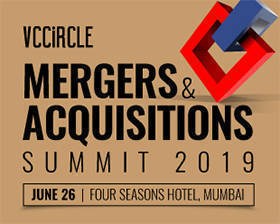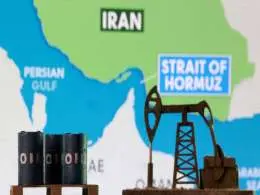 Dealmaking in India hit a record high last year, crossing the psychological milestone of $100 billion for the first time ever, as companies across sectors sealed mergers and acquisitions.
Dealmaking in India hit a record high last year, crossing the psychological milestone of $100 billion for the first time ever, as companies across sectors sealed mergers and acquisitions.
The M&A momentum is likely to pick up pace thanks to rising appetite of established companies and opportunities thrown up by stressed assets, among other factors.
To discuss the dealmaking opportunities and challenges, and lessons from past moves that worked and those that didn’t, VCCircle is organising its next edition of M&A Summit in Mumbai. The event got underway on Wednesday morning. Here's all the action as it happened:
2:00 PM: The day's proceedings conclude and the participants head for lunch and networking.
1:55 PM: Responding to a question on why there haven't been as many PE exits from capital markets in India as compared to the US, Gode said it is a function of the markets and that the trend may catch up in a few years.
Khan said PE firms prefer a clean exit. In capital markets, if you are in control, it's tough to exit via an IPO, he said.
1:50 PM: To a question from the audience on why there were few control deals in the consumer goods sector, Nirula said consumer firms don't have need for capital. But there are other drivers, with many companies looking to sell non-core assets.
While valuation can be a hindrance to consumer deals, other drivers such as divestment of non-core assets could be a trigger to M&As, he said.
Nirula also feels that consumer valuation are high, but said this is a good opportunity for PE firms to exit.
1:45 PM: Asked about their outlook for dealmaking in India, Jalan said the M&A trend will see an acceleration. Also, more deals with be struck where a controlling stake is being taken in an early stage.
Dealmaking will also increase as companies look to acquire access to new technology in different industries, he said.
Das said India is one of the fastest-growing countries and it will be an exciting time for strategic players.
1:40 PM: Asked what advice would they offer entrepreneurs looking to divest, Khan said they must run a good auction process.
Jalan said a seller must think about getting 98 cents to a dollar instead of 102 cents to a dollar. Basically, the seller must leave something on the table for the next owner, he said.
1:35 PM: Responding to a question on whether valuations were high, Jalan said it depends whether you buying into five years or ten years. From a medium-term to short-term perspective India valuations may look rich, but in the long term it will always be cheaper, he said.
1:30 PM: When Doshi asked whether PE firms had the ability to run businesses, Gode said PE firms wouldn't ink a control deal if they didn't have the confidence.
Khan said that a lot of PE firms now have operational partners, so they are able to do control transactions.
1:27 PM: When Doshi pointed out that PE control deals have increased while strategic deals have been flat, Jalan said this may be because the base was much lower for PE transactions.
HUL's Das said current valuations have caused corporates to pause a bit on deals. This may perhaps be a reason why the graph is flat.
1:23 PM: When asked if risk-adjusted returns for control deals are higher and whether this is driving more control deals, Gode and Nirula said this could be possible.
Jalan said yield enhancement happens in buyouts because of leverage. In global markets as a result, this drives higher returns.
Khan said that, in india, deals require a lot more financial engineering for leverage, as you need to set up offshore structures. We are still far away from using leverage to increase returns, he said.
1:20 PM: Khan said all top funds and sovereign wealth funds are talking about investing in India. They have also returned a lot of capital back to their limited partners (LPs). This has given LPs a lot of comfort in investing more.
Explaining the reasons for more control deals, he said that earlier PE firms had minority stakes and got burned out. So, they have decided that they want to have more 'control of their destiny', he said.
Khan also said that large companies want to focus on core businesses, so a lot of assets have become available for PEs.
Das said HUL is clear as to where it wants to be and where it doesn't. For example, in Modern Foods, HUL figured out that it was not the best owner of the business, he said.
1:18 PM: Jalan said both good and bad situations are triggering M&As. In 2008, it was distress fueling the M&A market. Today, it is a mix of both stress and positive factors.
Also, many MNCs are finding valuations more reasonable as compared to their home markets, Jalan said.
There has been a change in promoter mindset and selling out is no longer taboo. That's why this trend - of build and sell -- is rising, Jalan added.
1:16 PM: Gode also said that, apart from demand and supply, there are a lot of managers who are not available in the market and who can be quasi-entrepreneurs to the business backed by PE players.
He said that there was greater supply of managers and CEOs who have the capacity to partner with PE firms.
1:14 PM: Nirula said that, as India grows, there is increasing desire among PE firm to churn their portfolio. They feel they need to exit some of the businesses and focus on the core sectors.
In the 20 years in the industry, the amount of capital available among the PE firms has led to larger deals, Nirula said.
1:12 PM: Starting the discussion, Doshi asked why there has been an increase in PE-led control deals.
Gode said this has happened because of changes in the market and PE firms. Market-wise, companies have seen the work PE firms have done and have felt it to be impressive. PE-wise, the space is still quite young. Samara started with minorty deals but began doing larger deals as it felt more comfortable, he said.
1:10 PM: The last panel discussion of the day has started. The panellists will discuss PE buyouts as well as strategic M&As.
The speakers is this panel are Gautam Gode, co-Founder of Samara Capital; Vikram Nirula, co-managing director at Carlyle; Sumit Jalan, MD at Credit Suisse Asia Pacific; Iqbal Khan, senior partner of PE and M&A at Shardul Amarchand Mangaldas & Co; and Sourav Das, senior finance manager for M&As at Hindustan Unilever Ltd. VCCircle Special Correspondent Ankit Doshi is moderating the discussion.
1:03 PM: Concluding the discussion, Nandan said a new wave of structured data is coming in lately, new machine learning tools are coming up, including social media -- these offer a lot of information.
Among new trends, ESG investment is gaining importance, he said referring to environmental, social and governance investing. Going forward, sellers ought to be aware that they should be compliant with ESG issues, Nandan said.
12:58 PM: Kulsrestha said buyers of stressed assets must figure out who the creditors are. Can one of them bring an insolvency case and derail the whole trasaction?
Nandan also said that legal issues are the biggest risks for distressed assets. Government or courts can come and spoil a game.
12:56 PM: To a question on experience with due diligence and stressed assets, Nandan said that, first, you have to find out why the asset you’re targeting is stressed. Is it financing, business models or is the cost too high? Then, you have to see how you can bring in value to the asset in question.
12:53 PM: Wadhawan said when due diligence is being conducted, there is a risk to focus too much on the numbers. YOu need to go beyond that, and understand the business. Talk to people, figure out what is happening in the ecosystem (to avoid a Theranos-like situation).
Nandan said advisers are subject to biases, especially confirmation biases. Theranos was a case of that. Someone has to ask the necessary questions so that diligence can be conducted in a thorough manner, Nandan said.
12:50 PM: Jhawar played a video on Theranos as an example of diligence gone bad and the challenges faced by deal advisers.
Kulsrestha said no adviser can help in such situations. You’re relying on the promoter to give you all the information needed for an investment or transaction. Advisers need to talk among one another to see if there have been any red flags.
12:48 PM: Wadhawan said that what is important is if the company is aligned with the idea the investor has. If the investor has made investments in multiple companies in the space, the investor may be aligned to consolidation.
If your are aligned to that idea, then there is no problem. But if not, there needs to be clear terms in the contract. Maybe have seperate people (from the investor) as directors on competing firms. There should also be strong confidentiality safeguards in such instances.
12:46 PM: Jhawar said one of the things companies need to see is whether a potential investor has competing interests. "How do companies protect themselves from this phenomenon?"
Kulsrestha said it’s unrealistic to expect investors not to have competing interests. So companies need to ask where they can draw the line.
12:44 PM: Kulsrestha said one important aspect is the risk appetite of the investor. It differs quite a bit from entity to entity.
12:42 PM: Wadhawan said cultural match is also very important. This can determine the success or failure of a transaction.
Nandan said it’s good for a large company to do their own due diligence on a target.
12:40 PM: Nandan said the promoter expectation for valuation keeps increasing as the number of bids increase. When you find actual problems, you need to factor those in your valuation. To avoid mishaps, you need to make sure that the scope of your due diligence very clear. This is so that both sides can be realistic in their expectations, Nandan said.
12:35 PM: Jhawar said that in several instances, even the smallest of diligence issues can create bad situations, including to the point of deals being called off. "What can you do to make sure that the diligence doesn’t offend the promoters, but that they are highlighted for the buyers?"
Kulsrestha said how to pitch an issue and communicate it effectively is very important. It should be more of a fact-finding exercise, and not a fault-finding one. You are just there to highlight the potential issues and give credit where it is due.
12:30 PM: Nandan said if you see red flags, you need to put a probability on risks and quantify it and it will probably be factored into the valuation.
Wadhawan added that it’s also important to look at the primary drivers of the red flags, and if your objectives will be impacted by those.
12:26 PM: When Jhawar asked what was the difference in diligence in a regulated versus unregulated sector, Kulsrestha said there is more visibility and comfort in a regulated sector. Because there is a regulator, you will be able to be more thorough with your due diligence based on the target’s relationship with said regulator. If there is a big issue, chances are that it would have been picked up.
Effectively, and this is not just for legal diligence, once you have a list of existing issues, you need to consider whether this will factor into your deal, and whether there are indemnification options available to you, Kulsrestha said.
12:23 PM: Wadhawan said that, in the startup space, people focus is an important aspect of diligence. Around 75% of diligence is based on this, with the remaining 25% focussed on scalability of ideas and culture, he said.
Nandan said you need to do a deep dive into every aspect from the infrastructure point of view. For example, how is tax compliance being dealt with at a target entity? You also need to focus on partner diligence and legal aspects. Regulations are key since infrastructure is a very complex sector, he said.
12:20 PM: When Jhawar asked what key risks come up during due diligence, Kulsrestha said that depending on the sector, there are regulatory compliances to be looked. For example, real estate deals will look into titles very thoroughly.
12:15 PM: Initiating the discussion, Jhawar asked at what point does diligence take place?
Nandan said diligence starts from the day you receive information about the company or entity you’re targeting.
Kulsrestha said initial commercial diligence starts very early. This covers all the information you require on whether you should make that deal.
There are different kinds of diligence to conduct as well. Financial, technical, legal diligence. All of this usually starts at the same time, with a whole team of advisors working on this. What are you looking for during diligence? Is it valuation-related issues or something else?
12:05 PM: The second panel discussion is about to start after a tea and coffee break. The topic of discussion is due diligence.
The panellists are Devki Nandan, M&A head at JSW Infrastructure Ltd; Proptiger CFO Vikas Wadhawan; and Roopal Kulsrestha, M&A partner at law firm Shardul Amarchand Mangaldas & Co. Varsha Jhawar, head of M&A and investment banking at Alantra India, is moderating the discussion.
11:42 AM: Datta said they never asked anyone to go in all the acquisitions that they had done.
11:40 AM: Raibagi said his company tries to engage with the founders and promoters via workshops and discussions. When it comes to PE firms, price is important but we are interested in how soon you will close and with how much certainty will you close. We ensure that we give them comfort in these areas.
11:35 AM: Nag said a company's assessment has to be precise. How you handle the handle the situation from the first day. The success of the M&A depends on this.
The second thing to look at is avoid a ‘big brother in control’ scenario. The team of the acquired entity needs to be comfortable and feel secure with the objectives they’re pursuing. Ultimately, this is about people.
11:30 AM: Paradkar also said they structure a deal in such a way that there’s always skin in the game for outgoing promoters. To my mind, beyond strategy, M&A is a process. You have to handle hard aspects (such as regulations), but more importantly, how are you handling softer aspects -- how do you ensure that promoters who are exiting do not feel sore.
Eventually, success depends on how you draw synergies. And how do you make a post-merger integration plan, he said.
11:25 AM: When asked what kind of M&A style their respective companies followed, the panellists offered some valuable insights.
Paradkar said Mahindra doesn’t like hostile acquisitions. It’s always a partnership that we look for, he said.
11:20 AM: Datta also said that he was "allergic" to the word 'acquisition' because its like a big brother taking over a small one. It should be a “merger” of minds," he said.
Our M&A strategy success can be seen in two ways: we were able to completely shift from domestic to international business. Second, in most places where we have a presence we are a significant player.
11:15 AM: Datta said two things are important while considering acquisitions. One, you need to identify what stage a company is at. Second, what part of EEC [Enter, Expand or Control] do you want to stress on while acquiring?
11:13 AM: Nag said if you want to take yourself from 8% growth to 15%, you can’t just confine yourself to domestic markets. When you know what goal to acheive in the medium- to long-term, the process of acquisitions becomes that much easier, he said.
11:10 AM: When asked how companies decide on what kind of deal to make, Paradkar said it all depends on strategy. It could be related to many things, such as technology acquisition or growth.
11:07 AM: Raibagi said all of Wipro's acquisitions are part of a particular strategy. Most deals have focussed on building a new capability, especially since technology is never a stagnant sector. PLayers who adapt and improve are the ones who make moves and capture existing and newer markets, he said.
Raibagi said the second reason Wipro makes acquisitions is for access to markets. There are certain geogrpahies that are very important to us, and to get a foothold there, we make acquisitions that will help us, he said.
The third reason for deals is to build customer access and a customer base. Acquisitions also help in capturing a whole new segment of customers, he said.
11:05 AM: Datta said that, 15 years ago, Wockhardt's total turnover was 80% domestic and 20% international. Today, we are 67% international and 33% domestic, he said. On the other side, out of about 15-16 deals in the last few years, our success rate was about 90%, he added.
Datta said that, generally, entrepreneurs are positive. They never say their business is failing. Professionals bring in an element of caution and a bit of balance when it comes to objectives and aspirations.
11:02 AM: Nag also said the company is very conscious of the capital it is investing. "We always try to be conservative. Success lies in the money you pay for it," he said.
11:00 AM: Nag said Quess has grown its business in organic and inorganic ways. The company has struck around 24 transactions, he said. Every week, we see at least 2-3 opportunities from various business services, securities and other related segments.
We look at whether an acquisition will give us access to a new line of business or not. The second thing we look at is whether it is a strategic fit for us.
We also look at the management team of a company we’re acquiring. Are they strong? Can we work with them? Is there chemistry? Are they a cultural fit?
10:57 AM: Initiating the discussion, Paradkar said we define ourselves as investment bankers for the entire [Mahindra] group. We’ve done about an average of 12 transactions per year in the last ten years across several sectors; around 140 in total, he said.
10:55 AM: The first panel discussion of the day is about to start. The topic of the discussion is whether companies should make a big acquisition or adopt a string-of-pearls strategy.
The panellists for this discussion are Anil Raibagi, senior vice president and global head of M&A at Wipro Ltd; Manas Datta, group CFO at Wockhardt; Subrata Kumar Nag, group CEO and executive director at Quess Corp; and Vijay Paradkar, VP of M&As at Mahindra & Mahindra Ltd. VCCircle Assistant Editor Bruhadeeswaran R is moderating the discussion.
10:48 AM: When asked to comment on the manufacturing landscape in India, especially since the country's imports continue to be high, Mahansaria said this is changing and that he hopes this will continue to change. A lot of technological development after the economy's liberalisation in 1991 went to the IT sector and not to manufacturing, he said.
Today, India is getting more competitive in manufacturing. You’re starting to see domestic manufacturers become competitive vis-a-vis China. It’s not something that will happen overnight, but it is a journey that’s still going on, he said.
10:45 AM: When asked about his opinion on deal valuations and whether he expects dealmaking to accelerate, Mahansaria said the situation of the last nine months makes M&A much more feasible and realistic because of the pragmatic approach to valuations. We’ve already seen the pace of dealmaking pick up. We may not be seeing distressed deals yet, but we’re seeing realistic deals take place more and more often, he said.
"The phenomenon of mediocre businesses and absurd valuations has certainly corrected itself," he said.
10:44 AM: Talking about the themes within the manufacturing sector where there are opportunities, Mahansaria said India is strongly placed when it comes to manufacturing.
Today, if you locate your plant well, you enjoy globally competitive sourcing and logistics. One place where there is still a disadvantage is the cost of capital in India, which is much higher than global standards, he said.
10:42 AM: When Raghavan asked if there were any interesting themes for making investments, Mahansaria said that no matter what the sector, the growth challenges are always the same. There are always learning experiences that one can apply.
"For example, how digital-first thinking has become more important. How can you apply that to your business?"
10:40 AM: Giving some advice to entrepreneurs, Mahansaria said making good hires is definitely one area where entrepreneurs need good guidance. Especially if they’re first-time businesspeople, you need reassurance to be able to take leaps of faith, he said.
10:35 AM: When asked if there was a checklist when trying to scale a business, Mahansaria said any entrepreneur looking to expand a business must address some building blocks.
One, make sure you’ve understood the model and scaling it on an economically sustainable model. "I see a lot of business models today that exist on cash burn," he said.
The second thing to think about is a good management team that complements your own skillsets and style. Thinking about your capital strategy is also equally important.
You need to have good advice available to you as well. Sometimes, in the process of building a business, you run the risk of missing the big picture. Good advisers make sure you don’t, he said.
10:33 AM: Mahansaria said the off-highway tyre (OHT) business is a niche area. There are a finite number of business opportunities available. That makes the process of selecting an entity to acquire a much more rigorous and well thought-out one, he said.
An acquisition must add strategic value to the existing business. And one has to be careful about the size of the assets and businesses to be acquired, he said.
10:31 AM: "I think we had a very successful and enjoyable partnership with both funds we worked with. They brought a lot to the table, especially since we all had similar goals in mind," Mahansaria said.
He also said that partnering with funds, not just on the capital level but also on the strategic front, helped us make the international move in a much smoother way.
10:29 AM: When asked if he could give some insight into scaling businesses, Mahansaria said acquiring ATG turbocharged their growth because it gave them a head-start and helped avoid the pitfalls of building from the ground up.
10: 27 AM: Mahansaria said India is well-positioned to be a manufacturing hub for the whole world.
10:25 AM: Balkrishna was a learning experience in terms of how to build a business. "Back in those days, we still used fax machines and not emails. India was itself at a different point in its journey. Companies were just beginning to globalise," he said.
10:20 AM: Yogesh Mahansaria, co-founder of Alliance Tire Group and Mahansaria Tyres, starts a free-wheeling conversation with VCCircle Associate Editor Ranjani Raghavan.
"We’ve tried to build upon the theme of building businesses that appeal to not just India, but the global market as well," Mahansaria said.
10:17 AM: Mehta also said that M&As remain important among investors and strategic buyers.
10:15 AM: In his inaugural address, Mosaic Media CEO Jaideep Mehta said M&A continues to be the favourite mode of exits. He said 2018 was a record year for M&As. Almost 1,000 transactions and $80 billion worth of deals were recorded during the year, he said.







